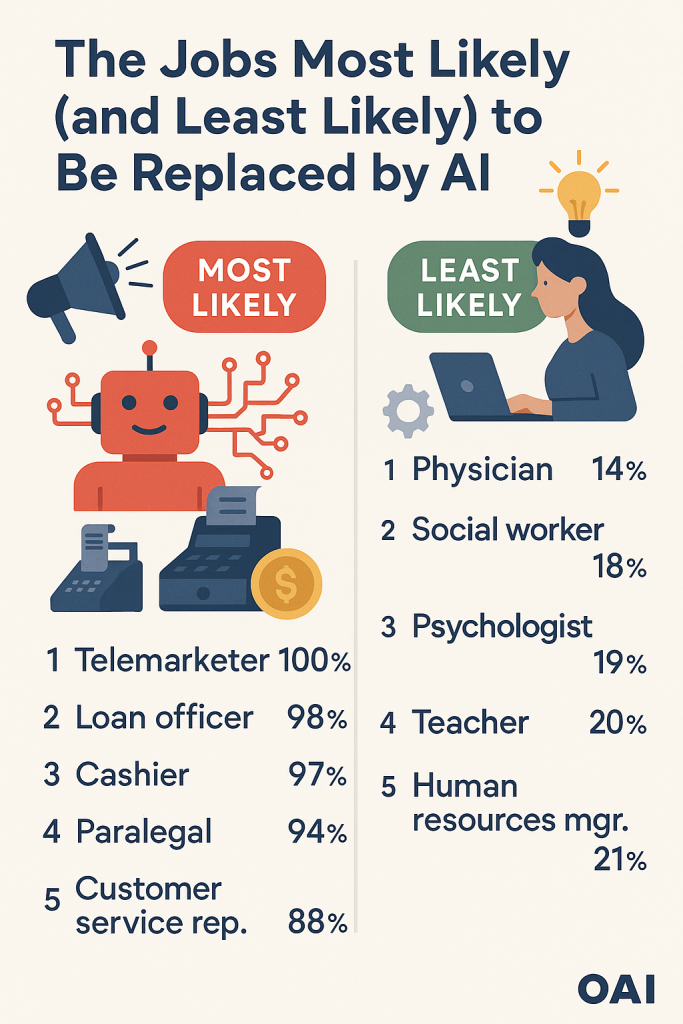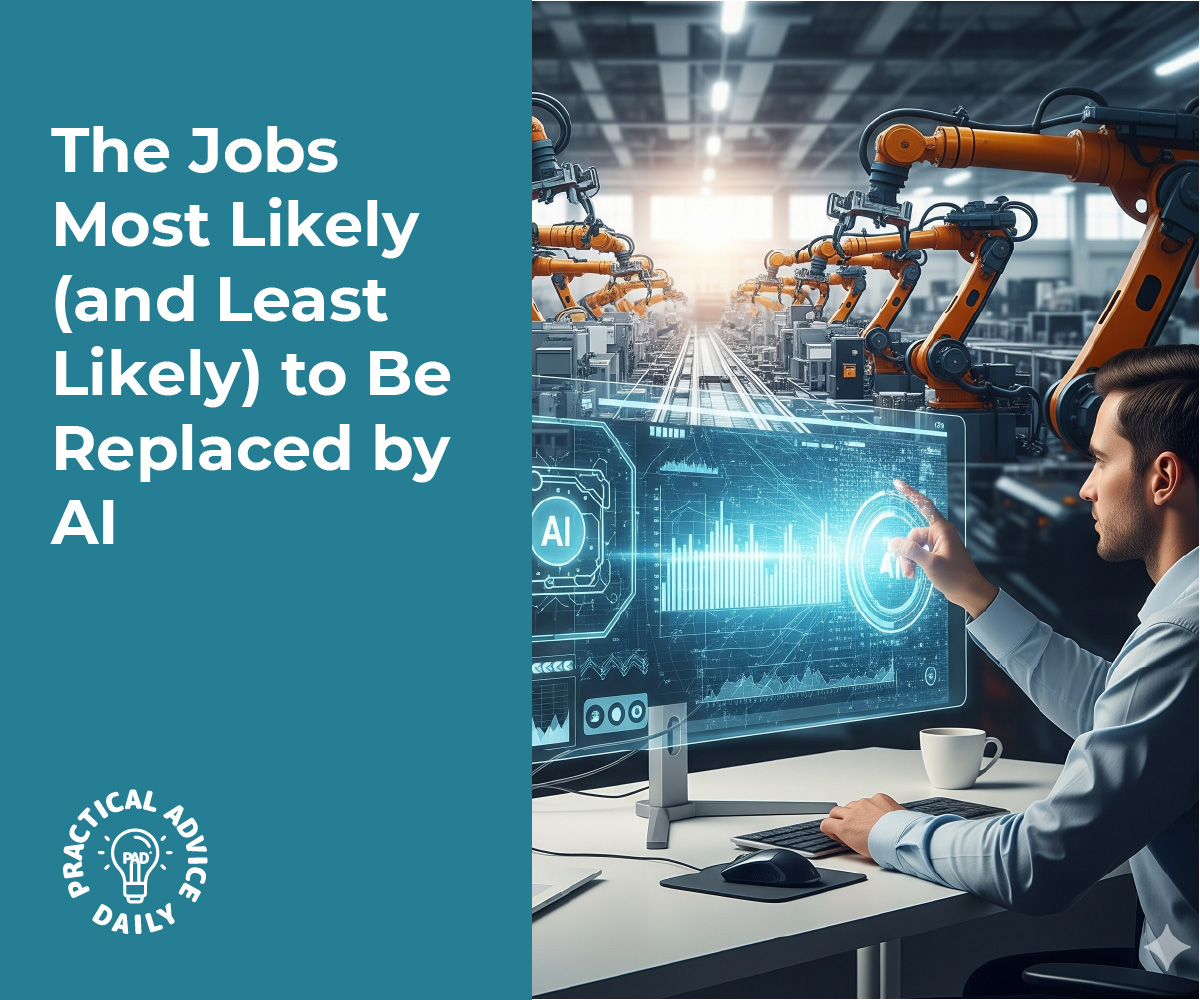Artificial intelligence (AI) is no longer just science fiction. From chatbots that answer customer questions to robots in factories, AI is changing the way people work. But this doesn’t mean every job is in danger. Some careers are more likely to be replaced by AI, while others will continue to rely on human skills that machines simply cannot copy.
In this article, we’ll look at which industries are most at risk, which jobs are safer, and how workers can prepare for the future. Don’t worry if you are not “tech-savvy.” We’ll keep it simple and easy to follow.
Table of Contents
Key Takeaways
- Jobs with repetitive tasks, like data entry or assembly line work, are at higher risk of being replaced by AI.
- Jobs that need creativity, personal interaction, or complex problem-solving are safer.
- AI will also create new opportunities in areas like healthcare, education, and technology support.
- Workers can prepare by learning new skills and focusing on tasks that require the “human touch.”
Jobs Most Likely to Be Replaced by AI
AI works best when tasks are predictable and repetitive. These are the jobs most at risk:
- Data Entry Clerks
- Entering numbers and text into systems is something AI can do quickly and accurately.
- Example: Many companies already use software that scans receipts or forms and fills in data automatically.
- Telemarketers
- Automated calling systems and AI chatbots can make sales pitches or answer basic questions.
- Example: You may have received an automated call offering a product or service.
- Factory and Warehouse Workers
- Robots can handle packing, sorting, and assembly line tasks around the clock.
- Example: Large companies like Amazon use robots to move products in their warehouses.
- Cashiers
- Self-checkout machines and AI payment systems reduce the need for human cashiers.
- Example: Many grocery stores now have more self-checkout lanes than staffed registers.
- Basic Customer Support Agents
- Chatbots can answer simple questions like “What’s my order status?” or “How do I reset my password?”
- Example: When you contact customer support online, the first response is often automated.
- Bank Tellers
- Online banking apps and ATMs already do much of the work once handled by tellers.
- Example: Depositing checks and transferring money can now be done entirely from your phone.
- Travel Agents (for simple bookings)
- AI-driven websites can compare prices, suggest hotels, and book flights instantly.
- Example: Many people now plan trips through online platforms without speaking to a person.
Jobs Less Likely to Be Replaced by AI
Some jobs depend on creativity, empathy, or complex decision-making, which AI cannot fully replicate. These are safer from automation:
- Healthcare Professionals
- Doctors, nurses, and caregivers need compassion, communication, and hands-on care.
- Example: AI can help with reading scans, but only a doctor can explain results with empathy.
- Teachers and Educators
- Teaching involves personal encouragement and adapting to each student’s needs.
- Example: A tutoring app may give practice questions, but a teacher motivates and supports students.
- Creative Professionals
- Writers, artists, musicians, and designers rely on imagination and original thought.
- Example: AI can suggest ideas, but only a human can tell a heartfelt story or create unique art.
- Skilled Trades
- Jobs like electricians, plumbers, carpenters, and mechanics require problem-solving in unpredictable situations.
- Example: Fixing a leaky pipe in an old house is not the same every time, making it hard for AI.
- Jobs Needing Human Relationships
- Roles like therapists, social workers, coaches, and managers rely on trust and personal connection.
- Example: People seek comfort and motivation from another human, not a computer program.
- Leaders and Decision-Makers
- Executives, community leaders, and politicians make complex choices that require ethics, vision, and understanding of people.
- Example: AI can give data, but only a person can decide how it affects a community or company.
How AI Can Support (Not Replace) Workers
It’s important to remember that AI is not only about replacing jobs. In many cases, it helps people work better:
- Healthcare: AI tools can scan test results faster, helping doctors treat patients more quickly.
- Education: Teachers use AI to track student progress and personalize lessons.
- Everyday Work: Office workers use AI tools like spellcheck, scheduling assistants, or fraud detection to make tasks easier.
- Transportation: GPS apps use AI to predict traffic and give drivers better routes.
- Customer Service: Chatbots can handle simple requests, while human agents focus on solving harder problems.
Instead of taking over, AI often becomes a helpful partner.

Preparing for the Future of Work
The good news is that people can take steps to protect their careers and even benefit from AI. Here are a few practical tips:
- Focus on Human Skills
- Improve communication, creativity, leadership, and empathy. These are skills AI cannot match.
- Improve communication, creativity, leadership, and empathy. These are skills AI cannot match.
- Learn to Work With Technology
- You don’t have to be a computer expert. Even simple knowledge, like using AI-based apps, can make you more valuable at work.
- You don’t have to be a computer expert. Even simple knowledge, like using AI-based apps, can make you more valuable at work.
- Stay Flexible
- Be open to learning new roles or combining skills. For example, a nurse who also learns to use AI health tools will be in high demand.
- Be open to learning new roles or combining skills. For example, a nurse who also learns to use AI health tools will be in high demand.
- Look for Growing Industries
- Healthcare, renewable energy, education, and technology support are expected to grow alongside AI.
- Healthcare, renewable energy, education, and technology support are expected to grow alongside AI.
- Lifelong Learning
- Online courses, community classes, or workplace training can help you stay updated. It’s never too late to learn.
Final Thoughts
AI is reshaping the workplace, but it does not mean every job will disappear. Jobs with repetitive tasks are at higher risk, while roles that require creativity, empathy, and human judgment remain strong.
The best way to prepare is to focus on what makes us human: our ability to connect, adapt, and think creatively. By staying open to learning new skills, we can work alongside AI instead of fearing it.
AI may change the way we work, but it also gives us a chance to grow and discover new opportunities.
